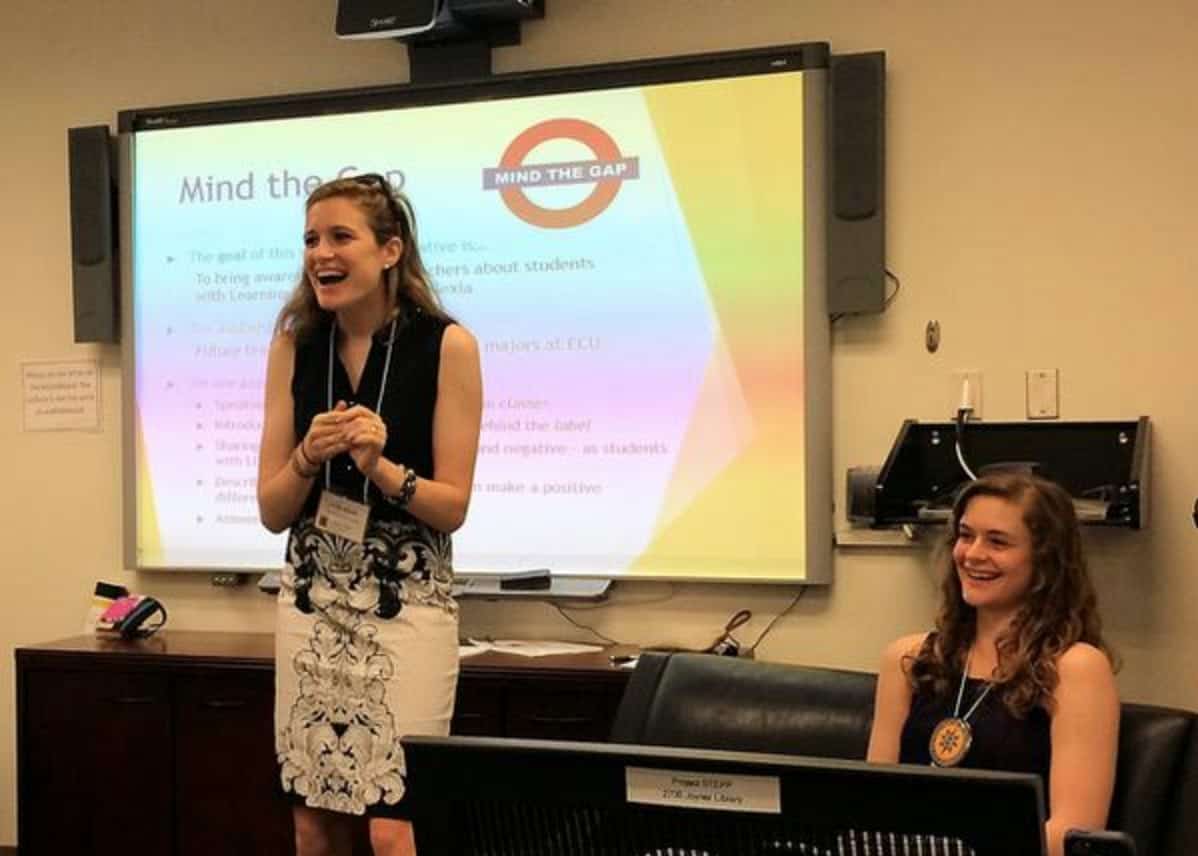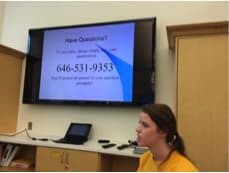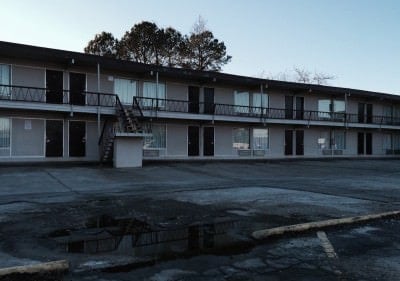
Stacy Parker-Fisher of the Oak Foundation in Chapel Hill says it all started with this premise, “What if you took a public university system and you made it welcoming for kids with learning differences?”
College STAR is a project of the University of North Carolina System to support students with learning differences. STAR stands for Supporting Transition, Access, and Retention. Led by Dr. Sarah Williams, an associate professor of special education at East Carolina University, the project is designed to reach students with learning disabilities, like attention deficit hyperactivity disorder and dyslexia, and make sure they have the opportunity to become successful learners.
But this program does not just aim to keep students in school and make sure they graduate – though that would be a lofty enough goal.
Many of the students are empowered by the program, using the confidence they find in the classroom to take on leadership roles in the university setting and beyond.
According to the National Center for Learning Disabilities, learning disabilities are “a neurological disorder that affects the brain’s ability to receive, process, store and respond to information.” Five percent of school-aged kids across the country – that’s 2.4 million students – have an identified learning disability. However, it is estimated that an additional 15-20 percent of students have a learning difference, often unidentified and undiagnosed. James Wendorf, the executive director of NCLD, says we risk leaving these students behind, “burdened by low self-esteem, subjected to low expectations, and diminished in their ability to pursue their dreams.” College STAR keeps that from happening here in North Carolina.
Marell Cook has dyslexia, which is especially tough given that her favorite thing to do is to write. Her largest class in high school was eight students, and coming to college she was nervous about the academics. She says College STAR has taught her to “live life to the fullest, and to not be scared about your disability.” She founded and edits a website and blog on learning differences designed to reach high school students thinking about college.
Lee Olsen graduated from college thanks to Project STEPP, the College STAR program at ECU. STEPP stands for Supporting Transition and Education through Planning and Partnerships. Project STEPP provides comprehensive academic, social, and life skills to 10 new students each year with learning disabilities.
But Lee didn’t just graduate. While she was at ECU, she established a local chapter of a national program called Eye to Eye. Eye to Eye is “a mentoring movement for different thinkers,” with the goal of getting kids to “own the label,” and also “create a world where people with LD/ADHD are fully accepted, valued, and respected.” Lee recruited 10 students at ECU – all with learning differences – to serve as mentors to 10 middle school kids – also with learning differences. Each week, the kids come to ECU on Friday after school to create an art project with their mentor.
Along the way, the mentors help the students identify how they learn best, teaching them learning strategies and self-advocacy skills.
Whether it is an art project or graduating from college, the message is, “if I can do it, you can do it.” Along the way, the mentors help the students identify how they learn best, teaching them learning strategies and self-advocacy skills. A showing in an art gallery at ECU at the end of each academic year gives the kids the opportunity to show off their pride in both the projects and their learning differences to parents and the community.
Mind the Gap is an initiative to raise awareness with teachers and policymakers about learning differences started by Emily Bosak, who was diagnosed with learning disabilities in second grade. It is impossible to hear Emily’s story and not end up in tears.
She says growing up most of her teachers didn’t understand what a learning difference was. They thought she needed to try harder. She talks about what it is like to stare at a math problem and have absolutely no idea where to start. Or to look at a word and have absolutely no idea how to break it down to begin to try and pronounce it. What she learned is that it wasn’t that she needed to try harder, it was that she needed to do things differently.
What does Emily want of teachers? “I want you to be patient. I want you to start the conversation with your students. I want you to understand and acknowledge that it is ok for us to have a learning difference.”
So far, four campuses – Appalachian State University, East Carolina University, Fayetteville State University, and UNC-Greensboro – are participating in College STAR, and more than 1,000 students have been served. The programs are small by design, and they are also intentionally different on different campuses to meet different needs. The hope is for College STAR to become a national model that other state universities will adopt.
In addition to the campus-based initiatives designed to serve students with learning differences, each campus in College STAR provides campus-wide support to teach students with learning differences. By working with faculty, College STAR has been able to raise awareness about learning differences. Tutors are embedded in really hard classes where lots of students get Ds, Fs, or have to withdraw, but students have to pass the class to continue on their course of study. An early warning system alerts administrators when students are having a hard time in a class. And, classes are being redesigned to make it less intimidating for students –for instance, they might respond using a clicker in class to express a response or opinion instead of having to speak out. Through these efforts, College STAR already has reached more than 9,000 students.

Hannah Woolard is a lead tutor in chemistry classes as ECU. She describes working with one student in the tutoring center for weeks on a particularly difficult concept. They went over it and over it and over it again. She used different strategies – some visual, some auditory, some incorporating experiential learning principles so the student could learn through practice. Hannah wondered if the student would be able to master the concept. Then, one day, she walked into the tutoring center, and she saw the student teaching the concept to another student. She was proud.
Dr. Sue Steinweg is an instructional consultant to College STAR, studying and sharing effective teaching practices. She signs her emails with a quote from W.B. Yeats, “Education is not the filling of a pail, but the lighting of the fire.” We know success is within reach for these students because of the famous people with learning disabilities that have paved the way, including CEO Richard Branson, football player Tim Tebow, movie maker Steven Spielberg, and activist Erin Brockovich.
College STAR is lighting the fire for students with learning differences in public universities across North Carolina, and that fire is driving students to find their own voices. Once shamed in class for being different, with the support of this program these rising stars will continue to shape their universities, our communities, the state, and as Emily says, “beyond.”
Mebane Rash wrote this article when she was the director of law and policy for the nonpartisan N.C. Center for Public Policy Research. It was previously published in The Durham Herald-Sun.


